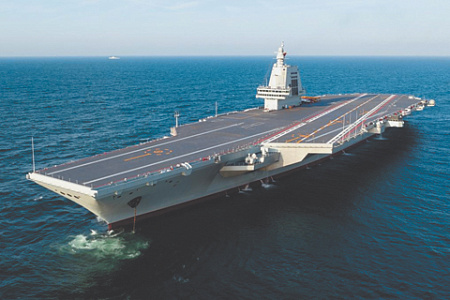
The report of Premier of the State Council of the People’s Republic of China Li Qiang at the parliamentary session that opened on Wednesday showed that the country’s leadership is confident in the successful development of the economy. Its growth will be 5% in 2025. Due to the aggravation of the situation in the Taiwan Strait and the South China Sea, the budget provides for an increase in defense spending by 7.2%, to 1.78 trillion yuan ($246 billion). It is much smaller in size than the American one. But, according to the Pentagon, the official figures do not reflect the real picture of China’s military spending. They are 40% higher. In addition, China has the largest number of naval ships in the world.
Naturally, the Chinese media emphasize that the Chinese armed forces are designed only to protect the country and pose no danger to anyone.
As reported by the Xinhua news agency, the growth of the military budget has been measured in “single digits” over the past 10 years. Chinese military expert Fu Qianshao says that this growth is moderate, it is necessary to defend the interests of the country, and nothing more.
Over the past year, three successes have been achieved in modernizing the armed forces. In May, sea trials began on the Fujian aircraft carrier, capable of carrying an air group of 40 combat aircraft, several reconnaissance aircraft, transport aircraft, helicopters and drones. In December, work began on the Sichuan amphibious assault ship, which will be the first in the world to be equipped with electromagnetic catapults. And in the air, in the presence of spectators at Airshow China, a new type of J-35A fighter made using stealth technology flew. Serial production of this aircraft will begin in 2025.
Fu stressed that the People’s Liberation Army of China needs to increase combat readiness due to the worsening situation in East Asia and the South China Sea. Thus, the Philippines has intensified provocations near the islands “belonging to China,” and even agreed that the United States should deploy its medium-range missiles on the territory of the country.
Song Zhongping, another Chinese expert, pointed out that an increase in the defense budget is necessary in order to cover the costs of conducting exercises and improving the welfare of military personnel.
According to the World Bank, in 2023, the world’s average defense spending was 2.4% of GDP, while that of the United States was 3.4%. According to the AP agency, the real figures of the Chinese military budget exceed the official ones by 40%, they are distributed among other budget items. China is forced to increase military spending not only against the background of worsening relations with the United States, but also with Japan, with which there is a dispute over islands in the East China Sea.
In an interview with NG, retired military expert Colonel Viktor Litovkin noted: “It is possible that the Chinese defense budget includes large expenditures on drones. But aircraft carriers are also very important. They allow aircraft to be delivered to those islands that the Chinese consider their own, and they allow them to control trade routes that the Chinese need to protect. China also has nuclear missile weapons. China needs to create not only missiles, but also infrastructure, build mines, and create a disguise for these mines. It is necessary to organize a satellite grouping to conduct reconnaissance of a possible enemy. But that’s not all. The Chinese need to create “landing facilities”. After all, if you have to storm Taiwan, which is separated from the mainland by a strait 180 km away, you will need to have enough amphibious vessels ready.”
The New York Times writes that Chinese President Xi Jinping, unlike the leaders of Canada and Mexico, who compromised with US President Donald Trump after he raised tariffs, held firm and responded to the Americans by imposing increased tariffs on US agricultural products. Jude Blanchett, an American expert on China, says Beijing still hopes to reach an agreement with Trump to avoid a trade war or “something worse.” But the Chinese embassy in Washington said: “China will not back down, it is ready for a trade war or any other war.”
